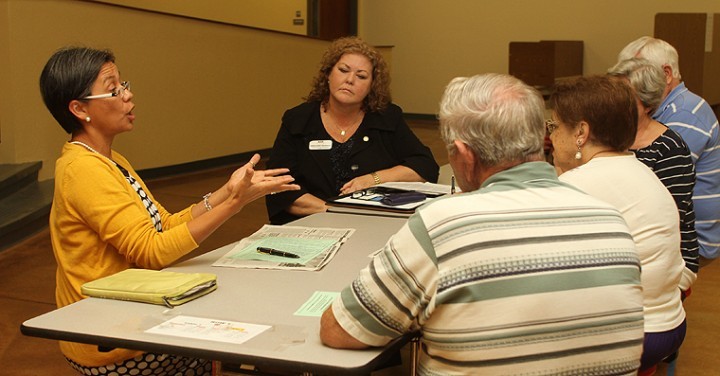
INDIAN RIVER COUNTY — Twenty concerned citizens gathered Tuesday evening in the Vero Beach Elementary School cafeteria to discuss four of the 12 amendments to Florida’s Constitution that voters will decide in the November election.
School Board members Karen Disney-Brombach and Claudia Jimenez led the discussion, giving a brief overview of the four amendments, without getting into the partisan politics behind each.
Amendment 8 received the most attention, because it is the most emotionally charged of the proposed amendments.
While it is called the “religious freedom” amendment, Disney-Brombach and Jimenez both pointed out that it is more about “religious funding” than it is about “religious freedom,” and that religious freedom would in no way be restricted if it didn’t pass.
They also told the group of citizens gathered in the cafeteria, who were mostly over 60 years old, that it opened the door for all tax-exempt organizations declaring themselves to be religions to receive tax-payer dollars for their religious schools.
“Like Bong Heads for Christ,” said Jimenez.
“It wouldn’t matter how off-the-wall or extreme,” said Disney-Brombach.
An audience participant said he would predict that the state legislature would enact some kind of restrictions to keep the money from going to unaccredited, extreme schools.
Jimenez countered that such monitoring had not been the case with some of the virtual schools that were the subject of recent law enforcement investigations that resulted in their being closed, and she wouldn’t think the audience member could depend on lawmakers to oversee who got the money for religious schools and who didn’t.
Several audience members wanted to know if particular amendments were pro-business, or pro-Democratic or pro-Republican, but neither Jimenez nor Disney-Brombach would characterize the amendments with partisan or special interest labels.
Disney-Brombach did offer an overview of pros and cons on proposed Amendments 3, 4 and 10. The general pro, she said, was that the amendments cut taxes. But the con was that, by so doing, they also cut a variety of services.
The school board members were asked if all of the amendments would affect revenue for Indian River County public schools.
They explained that Amendment 4, which would reduce county taxes on commercial properties, would have almost no affect on public school dollars.
The same is true for Amendment 10, said Disney-Brombach, which would double tax exemptions on certain tangible personal property.
“The peripheral school budget would be affected,” said Disney-Brombach, “like money for school resource officers, but our direct funding would hardly be affected at all if Amendments 4 and 10 pass.”
Still, they cautioned that voters need to know what they’re doing when they vote constitutional amendments in.
To pass a constitutional amendment requires a majority vote. But to get rid of an amendment, once it is passed and enshrined in the Florida Constitution, takes over 60 percent of the vote.
The point being, said the school board members: Learn about the amendments and vote from a position of knowledge.
“We have a Constitution that was carefully written and we shouldn’t be flinging in amendments without a lot of thought,” said Disney-Brombach.
“Amen,” shouted a couple of audience members, who said after the meeting, while they are religious, they will vote against the “religious freedom” amendment, which is Amendment 8.



